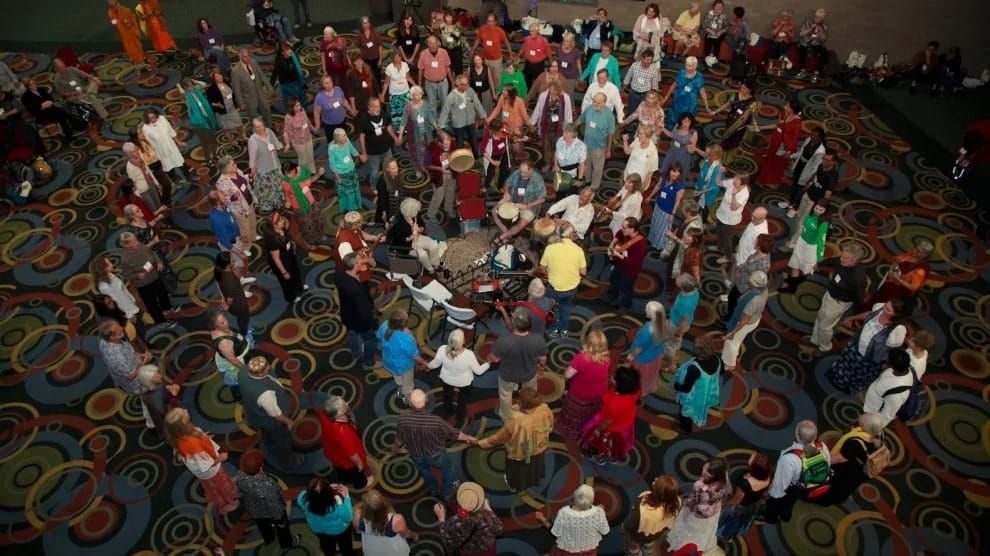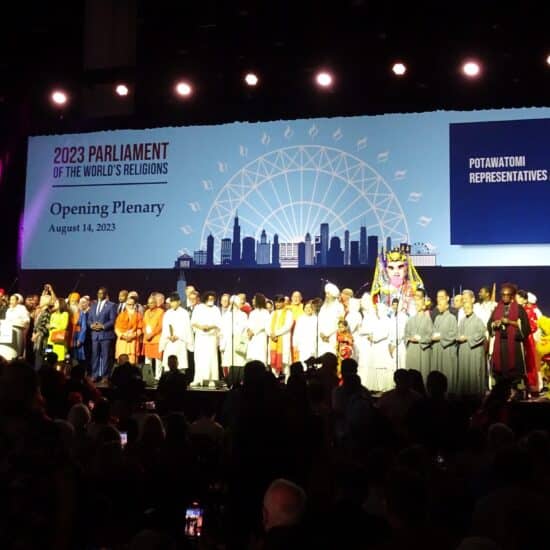TORONTO (RNS) — With its theme of “The Promise of Inclusion, the Power of Love,” and its focus on global understanding, the seventh Parliament of the World’s Religions could hardly have picked a more inclusive spot than Toronto, Canada’s largest city. The more than 8,000 people expected from 80 countries in this weeklong gathering will hardly stand out in the polyglot crowds that coexist in Toronto’s diverse neighborhoods.
Karen Hamilton, co-chair of the Parliament’s Toronto hosting committee and former General Secretary of the Canadian Council of Churches, said the event is an opportunity to showcase “the richness of the various faith traditions that are growing in this country.”
 A drumming circle pulls dancers together at a Dances of Universal Peace even at the 2015 Parliament of the World’s Religions in Salt Lake City, Utah. (Credit: Parliament of the World’s Religions)At the same time, she hopes participants will be encouraged by how people of different faiths cooperate in Canada, taking “lessons learned and relationships formed back home, transferring them to different contexts.”
A drumming circle pulls dancers together at a Dances of Universal Peace even at the 2015 Parliament of the World’s Religions in Salt Lake City, Utah. (Credit: Parliament of the World’s Religions)At the same time, she hopes participants will be encouraged by how people of different faiths cooperate in Canada, taking “lessons learned and relationships formed back home, transferring them to different contexts.”
But, she added, the Nov. 1-7 parliament will not be a big “pat on the back” for faith.
Things have been done in the name of religion, Hamilton said, that are “absolutely dire and that need to be addressed with a deep sense of repentance.” As examples, she pointed to failure to take climate change seriously, attitudes toward women, and the ways religion “has been used to support genocide, wars, persecution and injustice.”
Fittingly, the parliament will open with an acknowledgment that the gathering is being held on traditional indigenous lands, part of a growing consciousness about Canada’s history of persecution of its original inhabitants. Indigenous people of Canada will participate in the opening ceremonies, and a sacred fire will burn throughout the event.
“We want to highlight the vibrancy of indigenous traditions in Canada,” said Hamilton, adding she hopes the emphasis will also “cause people from other countries to reflect on their own indigenous traditions.”
“We need to keep challenging ourselves, need to keep speaking about our failings as people of faith. That is the mark of a healthy spirituality,” said Hamilton.
This spiritual accounting will be discussed in more than 500 addresses, seminars and other programs, divided into tracks about the role and dignity of women in religion; countering war, hate and violence; climate change; indigenous peoples; youth; and working to achieve a more just, peaceful and sustainable world.
The first parliament was held in Chicago in 1893. After a 100-year hiatus, it was held again in Chicago in 1993, followed by Cape Town (1999), Barcelona (2004), Melbourne (2009) and Salt Lake City (2015).
The concerns of this parliament are already the focus of much of the good work people of faith do, said Zul Kassamali, president of the Toronto Area Interfaith Council and co-chair of the Canadian Interfaith Conversation, who is sharing co-chairing duties at the Parliament with Hamilton. But too many believers, he said, are still “working in silos.”
The parliament, he said, will “bring people together to learn what others are doing and find ways to connect. We can learn something from each other. That is the most important thing.”
Kassamali hopes that as participants share solutions to these global problems, the gathering can also be a way to counter the negative image of religion in the world today.
“We need to show a different side to faith,” he said.

